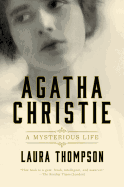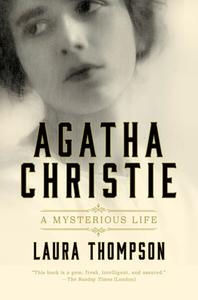
 Known as the Queen of Crime, and a perennial bestselling author decades after her death, Agatha Christie is a subject of fascination. Born and raised in the coastal town of Torquay, England, she enjoyed an idyllic childhood and an unusually close relationship with her mother, Clara. Christie married twice and had one daughter, spent significant time in the Middle East on archeological digs, wrote hundreds of letters in addition to dozens of mystery novels and short stories, and created two of literature's most enduring detectives, Hercule Poirot and Miss Jane Marple.
Known as the Queen of Crime, and a perennial bestselling author decades after her death, Agatha Christie is a subject of fascination. Born and raised in the coastal town of Torquay, England, she enjoyed an idyllic childhood and an unusually close relationship with her mother, Clara. Christie married twice and had one daughter, spent significant time in the Middle East on archeological digs, wrote hundreds of letters in addition to dozens of mystery novels and short stories, and created two of literature's most enduring detectives, Hercule Poirot and Miss Jane Marple.
Biographer Laura Thompson (The Six) delves into Christie's personal history in Agatha Christie: A Mysterious Life. She paints a charming picture of her subject's childhood and young adult years. A lifelong observer of people's quirks and character traits, she was "more astute in her art than in her life," Thompson says. She points to Christie's convoluted relationships with her first husband, Archie, and her daughter, Rosalind--contrasting them with Poirot's cool detachment and Miss Marple's keen insight into human nature. Thompson also makes much of the six novels Christie wrote under the pen name Mary Westmacott, especially Unfinished Portrait, which draws heavily on her life experiences.
Fans have long been intrigued by Christie's 11-day disappearance in 1926, when her first marriage was on the rocks and her health (physical and mental) was in question. Thompson narrates this episode from Christie's perspective, so that the interlude takes on a dreamlike quality. Only later does she report the facts of Christie's husband finding her in a Yorkshire spa town, and the newspaper articles surrounding her actions. The book picks up speed after that, focusing on her career as a novelist and playwright, and her seemingly infinite ability to conceive brilliant mystery plots. Thompson praises her "supremely deceptive simplicity" as a writer and the sparkling clarity of her books. Later Thompson focuses on Christie's second marriage, to the archeologist Max Mallowan, and the increasing difficulty of being Agatha Christie the woman (and writer) while managing Agatha Christie the commodity and public figure.
"No life is a code to be deciphered," Thompson writes. "Omniscience is for Hercule Poirot. Real life knows less; it has the beauty of mystery." Christie captured that mystery brilliantly in her books, and Thompson does her best to explore--though never entirely to solve--the mysteries of author's life. --Katie Noah Gibson, blogger at Cakes, Tea and Dreams
Shelf Talker: Laura Thompson's extensive biography of Agatha Christie delves into her personal history and prolific career.

